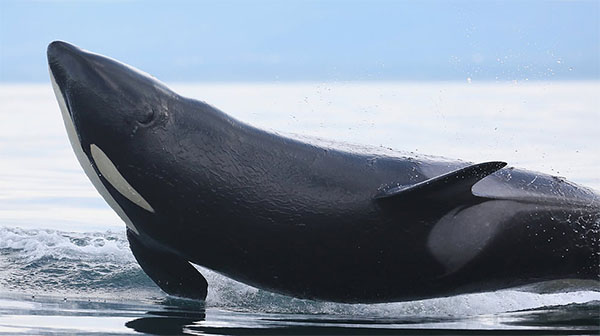||| FROM CENTER FOR WHALE RESEARCH |||
Comment to the Agenda Item concerning Commercial Whale Watching Public Hearing at the December 3-5, 2020 WDFW (Washington Department of Fish & Wildlife) Commission Meeting
Dear Commissioners:
The southern resident killer whales (SRKWs) are top-level marine predators that have evolved a specialized diet consisting predominantly of salmonid fish that historically were in great abundance year-round in eastern North Pacific coastal waters from central California to Alaska. They can eat other species of fish and invertebrates such as squid, but their dietary preference, if not their nutritional obligation, is to consume relatively large species of salmon such as mature Chinook that provide much more energy than it takes to catch them (particularly when they are in abundance as they migrate toward rivers to spawn).
These large nutritious salmon have also been the target species for human harvests at or near the river’s entrance and on high seas; and, in the recent century and a half, these ‘King’ salmon have been harvested by the millions to the point that they have been largely decimated in much of their former range. Historically, a huge percentage of the spawning ‘runs’ of these fish was legally allowed harvest by human fisheries, and the remaining were challenged by habitat degradation and denial of access to their spawning areas up-river.
The natural marine predators that consumed salmon were typically considered the competition for human fisheries, if not the enemy.

K16 with a Chinook salmon in its mouth. Photograph by Center for Whale Research
The Washington State Department of Fish and Wildlife (WDFW) and NOAA Fisheries have been the managers of these human fisheries with tribal co-managers during the recent half-century, and it is under their watch that virtually all of the natural wild Chinook salmon stocks in the eastern North Pacific Ocean have declined to the point of being threatened and endangered with biological extinction throughout most of their range. This is not to say that these agencies are solely responsible for the declines, but they have pursued ineffective policies and actions to significantly curtail or reverse the catastrophic declines of salmon wrought by humans.
The SRKWs depend upon Chinook salmon for survival, whereas humans depend upon them for commerce. The policies and actions by WDFW and NOAA and first nation co-managers have been heavily biased toward continuation of the commerce side of Chinook management, and fisheries management in general, for human benefit. The ecological aspects of fisheries management have only recently been acknowledged as important, and the situation of SRKWs and salmon is a case in point. How are fishery managers, steeped in commerce, to handle this conundrum?
Look for a scapegoat! Colleagues and I have abundantly demonstrated that the demographic vigor, and even survival, of the SRKW population is inextricably linked to the biomass of Chinook salmon within the whales’ foraging range. Yet, the agencies involved in fisheries management are now arguing that the poor survival of SRKWs is due to vessel interference, in a second-order argument, while continuing to justify fisheries policies and actions that are clearly not working for fish survival. They also conveniently disregard the indisputable fact that fishing vessel interference in yesteryear, and any second-order noise effects, were by far more prevalent than any potential whale-watching effects are now, … IN the very areas where salmon and SRKWs occurred!

Ken Balcomb, Center for Whale Research Founder and Senior Scientist
Let me be clear: drawing upon my 45-year experience studying the SRKWs in thousands of research encounters from 1976 to 2020, I can clearly see that these whales have ZERO chance of avoiding biological extinction within the next few decades under agency management status quo, even with the proposed regulatory regime. NOAA essentially agrees but extends the total extinction timeline to the end of this century.
A complete moratorium on vessel traffic of any kind will not change this outcome – you are only talking about regulating activities in an area that most of these whales now use less than 10% of the time. The most endangered matrilines of SRKWs use this area less than 2% of the time! That is, most of their life is spent elsewhere in waters where you cannot effectively regulate vessel traffic! Nor can you effectively regulate the most egregious of vessel noises that supposedly interfere with the whales’ biosonar or noises that are injurious.
The only chance for the SRKW population to avoid biological extinction is to allow them sufficient food resources throughout their range. I know that WDFW efforts at vessel regulation are well-meaning, but they are not well advised, and they are leaning toward ridiculous, wasting the public’s money and attention on vessel issues on the west side of San Juan Island and Puget Sound is simply not going to help the SRKWs survive.
Their only chance of survival is with a complete paradigm shift in fisheries management to provide the priority of salmon recovery for the whales’ recovery, if that is what is truly desired.
We have a clue concerning the goal — the SRKW population did historically increase following their severe exploitation when the native salmon were at 1970s population levels (i.e., just prior to the excessive salmon harvests of the late 1970s and early 1980s). WDFW knows how many Chinook was harvested that had passed through the Strait of Juan de Fuca – 1.5 to 1.9 million! DFO estimates add more. Restoration of salmon to those pre-exploitation levels should be an urgent priority, and human fisheries must adjust accordingly.
Kenneth C. Balcomb, III, professional whale biologist since 1964 and Founder of The Whale Museum and Center for Whale Research in Friday Harbor, WA 1979 and 1987, respectively. Co-Developer of innovative Photographic Cetacean Individual Recognition Technique with Dr. Mike Bigg, DFO and Dr. Steve Katona, College of the Atlantic in the 1970s
**If you are reading theOrcasonian for free, thank your fellow islanders. If you would like to support theOrcasonian CLICK HERE to set your modestly-priced, voluntary subscription. Otherwise, no worries; we’re happy to share with you.**








“Their only chance of survival is with a complete paradigm shift in fisheries management to provide the priority of salmon recovery for the whales’ recovery, if that is what is truly desired.”
Like Orcas, like people… when money is the prime motivator it shows that we need a complete paradigm shift in the way we manage a lot of
things.
As consumers, there is something we can do for the Orcas: boycott King/coho salmon.
Correction: King/Chinook salmon.